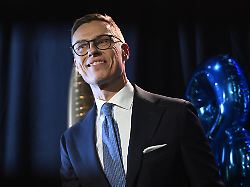Update
Tough attitude towards Moscow
Center-right candidate becomes new president of Finland
February 11, 2024, 7:46 p.m
Listen to article
This audio version was artificially generated. More info | Send feedback
Finland has a new president. Alexander Stubb prevailed in the runoff election. The conservative stands for a tough stance towards Moscow.
Former Prime Minister Alexander Stubb will be the new President of Finland, according to one projection. According to the Finnish radio station Yle, the 55-year-old center-right candidate narrowly beat his green opponent Pekka Haavisto in the runoff election for the presidency. Haavisto congratulated Stubb on his election victory. After 99 percent of the votes were counted, Stubb had 51.7 percent of the vote and Haavisto had 48.3 percent.
Stubb received the most votes in the first round on January 28th, but was not the clear winner. Stubb was further ahead in polls. According to them, some Finnish voters rejected Haavisto because of his open homosexuality. Almost 46 percent of those eligible to vote use postal voting, and final results are expected later in the evening.
The election marks the dawn of a new era for the 5.5 million Finns. Incumbent Sauli Niinistö had for a long time – as has been the case in Finland for decades – pursued a diplomatic foreign policy, particularly towards its neighbor Russia. Because of his initially good relations with President Vladimir Putin, he was nicknamed the “Putin Whisperer.” However, in response to Russia’s war of aggression against Ukraine, Niinistö led his country from traditional non-alignment into NATO. Niinistö was not allowed to run again after two six-year terms.
All candidates for the state leadership had announced a tough stance towards the government in Moscow during the election campaign. Stubb said in a recent interview: “Politically, there will be no relations with the Russian president or the Russian political leadership until they end the war in Ukraine.” The 55-year-old is committed to deeper integration into NATO, which could also include stationing alliance troops in Finland. However, he rejects the storage of nuclear weapons. Former Foreign Minister Haavisto was more reserved and described a NATO contingent in Finland as unnecessary.
The head of state in Finland has more extensive executive powers than, for example, the Federal President in Germany. The Finnish president leads foreign and security policy in close cooperation with the government, represents the country at NATO meetings and is commander in chief of the armed forces.
